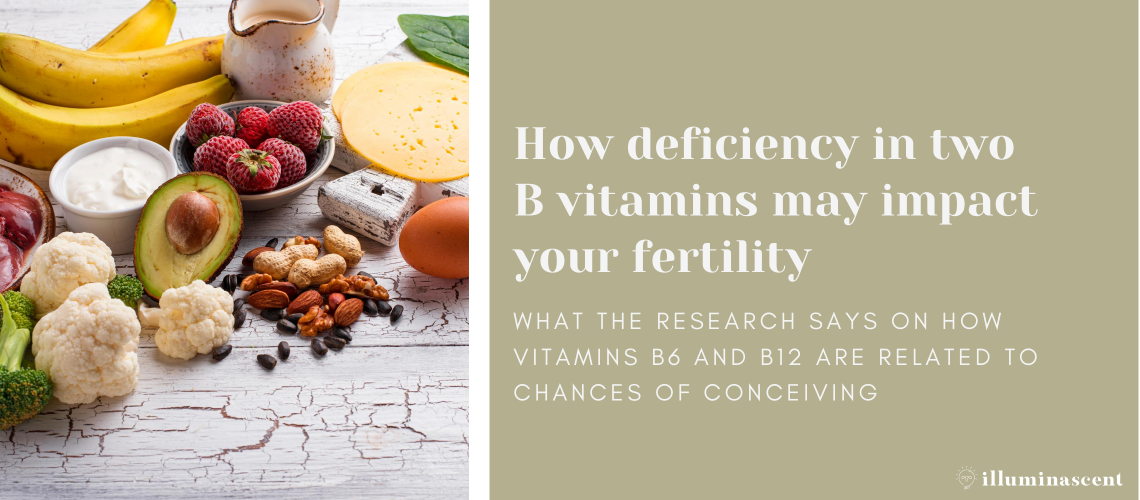*Trigger warning – Pregnancy loss*
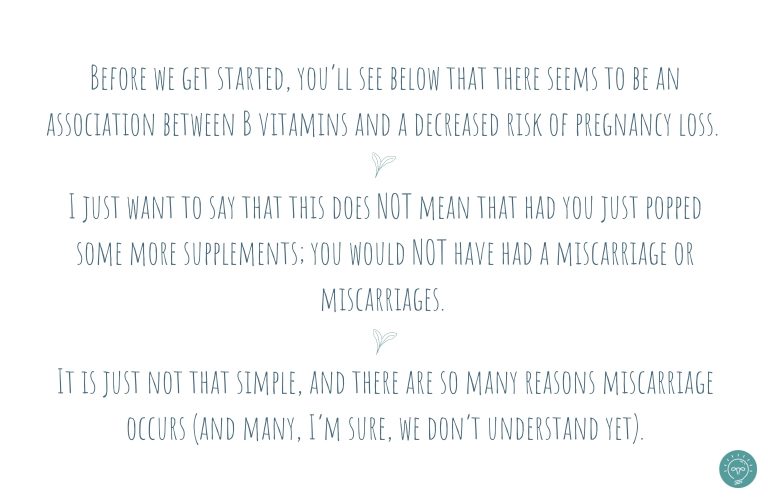
I have a bit of a love for supplementing B vitamins.
There are two ways in which I believe B vitamins have helped me (i.e. two anecdotal, completely unscientific and unproven stories to start our chat here ;))
- After 8 months of ovulating on day 19 of a 28-day cycle (which some could call a luteal phase defect – a luteal phase that is too short to produce a uterine lining to support pregnancy), my first month of supplementing with a B complex I ovulated on day 14 (and I got pregnant)
- When my cycle came back after my 3rd it was long and irregular, which is very unusually for me. After a few months I decided to take a B complex. I literally supplemented for 1 week at the start of my cycle before stopping (because being a grown-up is hard). But this is what my cycle looked like before and after: 38 days, 55 days, 35 days, 37 days, [supplement for 1 week], 29 days, 29 days, 29 days.
Lucky for us, there is more information out there than my random anecdotal stories. There’s actually quite a bit of research on B vitamins and their relation to fertility and pregnancy.
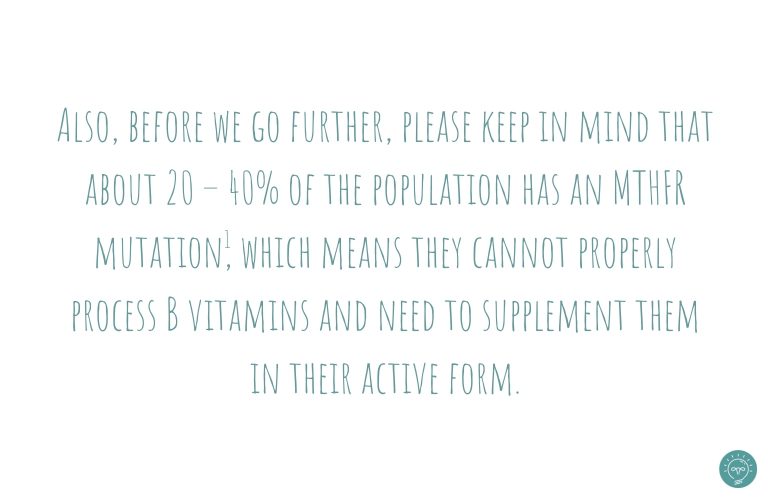
Since most people haven’t had the genetic testing to tell them if they have this genetic mutation, some providers will recommend just supplementing the active form to ensure your body is getting the most out of your supplements.
And of course, B vitamins in their natural state – in food, are already in the active forms, so that’s always good to keep in mind (that said – all of our grains and cereals in Canada tend to be fortified with B vitamins, and they are not the active form!). However, many vitamin brands now make ‘active’ or ‘biologically available’ forms of supplements.
As always, please speak to a healthcare professional before starting supplements, as they can assess what may make sense for you and your unique situation. In my experience, a good naturopathic doctor can make a world of difference on this front.
How common is B vitamin deficiency?
Most research looks at the deficiency of specific B vitamins. Since today we’re talking mostly about vitamins B6 and B12, we’ll stick with those.
A large 2008 National Health and Nutrition Examination Survey in the US found that the prevalence of B6 deficiency in females aged 21 to 44 years was 40%.2
That, however, is quite a bit more than a recent 2016 study out of Vancouver Canada looking at 202 young adult females that reported a B6 deficiency of 1.5%, but a deficiency/suboptimal rate of 12.4%.3 The difference was thought to be due to the relatively high socioeconomic status in the Vancouver study.
Vitamin B12 deficiency is actually considered a major public health problem worldwide, and deficiency is particularly high in more resource-limited countries.4-8
Data on B12 deficiency is limited, but in the United States it’s thought to be around 6%.9-10
Why is vitamin B6 important?
Having adequate vitamin B6 levels is an important part of a successful conception and pregnancy.
Vitamin B6 supplementation has been associated with higher infant birth weight11, a lower rate of preeclampsia, and low maternal B6 status has been associated with a lower Apgar score.12-13
Vitamin B6, conception, and pregnancy loss
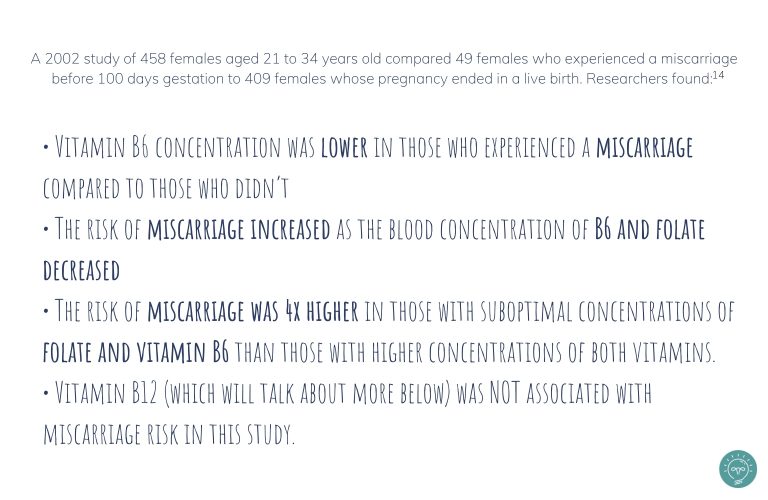
A 2007 study of 364 people looked at vitamin B status and conception and pregnancy loss.15
They divided people into 4 groups depending on vitamin B6 status, from the 25% with the lowest B6 (group 1) to the 25% with the highest B6 (group 4).
- Those in the highest 2 groups (groups 3 and 4) had a higher chance of conception
- Those in the highest group (group 4) had a lower risk of early pregnancy loss
Those with adequate vitamin B6 had a higher chance of conception and lower chance of pregnancy loss than those with deficiency.
Why is vitamin B12 important?
Maternal vitamin B12 deficiency is associated with increased risk of common pregnancy complications, including miscarriage, recurrent pregnancy loss, low birth weight, and neural tube defects.16-21
Vitamin B12 insufficiency can impair infant growth, psychomotor function, and brain development, which may be irreversible.22-23
Vitamin B12, conception, and pregnancy loss
A small 2001 study looked at the medical history of 14 people who were vitamin B12 deficient.24
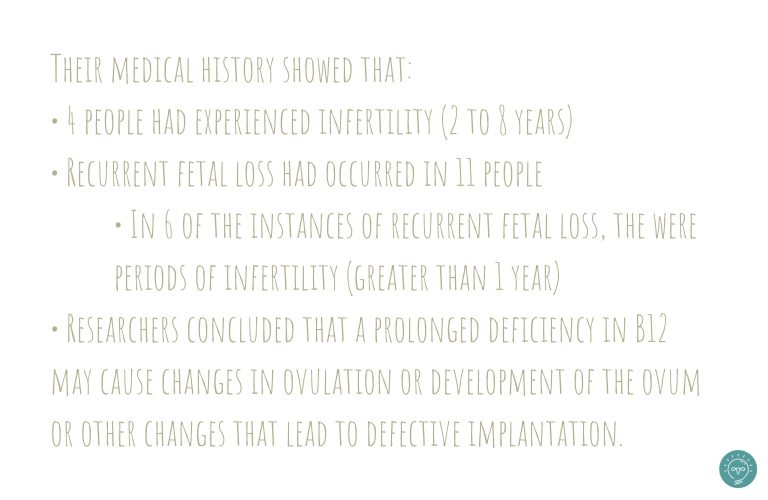
A 2015 study looked at rates of folate and vitamin B12 and how they were associated with those using assisted reproductive technology (ART).25
A random sample of 100 females (154 ART cycles) looked at levels of folate and B12 and found that the 25% of people with the highest amount of:
- Folate had 1.62x the chances of a live birth
- B-12 had 2.04x the chances of a live birth
Having high levels of BOTH folate and B-12 increased chances of live birth compared to those with high levels of just one of the two.
Lastly, many studies have shown vitamin B12 to have a positive effect on semen quality – by both increasing sperm count and motility.26
B vitamins in general
The Nurse’s Health Study II is a huge study that follows nurses over a long period of time in order to learn about the role of diet and lifestyle on many chronic diseases.27 Its size alone gives weight to the strength of its findings.
In 1989, 116 671 female registered nurses, aged 24 to 42, joined the study and are followed every 2 years via questionnaires.
This 2008 study looked at 18 555 married, pre-menopausal women without a history of infertility who tried to get pregnant, or got pregnant, between 1991 and 1999, and specifically looked at those who weren’t ovulating (‘ovulatory infertility’).
Over 8 years of follow-up 438 females reported infertility due to ovulatory disorder.
Researchers found chances of ovulatory infertility decreased as frequency of multivitamin use increased, with folic acid explaining part of the association between supplement use and risk of ovulatory infertility.
Researchers concluded regular use of multivitamin supplements may decrease the risk of ovulatory infertility.
What's the take-home message?
- B vitamins, specifically folate, B6, and B12 have been associated with an increased chance of conception, and a decreased risk of pregnancy loss
- Due to the prevalence of the MTHFR mutation, B vitamins may be best supplemented in their activated form, talk to your healthcare practitioner about what is right for you
REFERENCES: 1. Levin BL, Varga E. MTHFR: Addressing Genetic Counseling Dilemmas Using Evidence-Based Literature. J Genet Couns. 2016;25(5):901-911; 2. Morris MS, Picciano MF, Jacques PF, Selhub J. Plasma pyridoxal 5′-phosphate in the US population: the National Health and Nutrition Examination Survey, 2003-2004. Am J Clin Nutr. 2008;87(5):1446-1454; 3. Ho CL, Quay TA, Devlin AM, Lamers Y. Prevalence and Predictors of Low Vitamin B6 Status in Healthy Young Adult Women in Metro Vancouver. Nutrients. 2016;8(9):538. Published 2016 Sep 1; 4. Allen LH. Folate and vitamin B12 status in the Americas. Nutr Rev. 2004;62(6 Pt 2):S29-S34; 5. Siekmann JH, Allen LH, Bwibo NO, Demment MW, Murphy SP, Neumann CG. Kenyan school children have multiple micronutrient deficiencies, but increased plasma vitamin B-12 is the only detectable micronutrient response to meat or milk supplementation. J Nutr. 2003;133(11 Suppl 2):3972S-3980S; 6. McLean ED, Allen LH, Neumann CG, et al. Low plasma vitamin B-12 in Kenyan school children is highly prevalent and improved by supplemental animal source foods. J Nutr. 2007;137(3):676-682; 7. Refsum H, Yajnik CS, Gadkari M, et al. Hyperhomocysteinemia and elevated methylmalonic acid indicate a high prevalence of cobalamin deficiency in Asian Indians. Am J Clin Nutr. 2001;74(2):233-241; 8. Taneja S, Bhandari N, Strand TA, et al. Cobalamin and folate status in infants and young children in a low-to-middle income community in India. Am J Clin Nutr. 2007;86(5):1302-1309; 9. Allen LH. How common is vitamin B-12 deficiency?. Am J Clin Nutr. 2009;89(2):693S-6S; 10. McLean E, de Benoist B, Allen LH. Review of the magnitude of folate and vitamin B12 deficiencies worldwide. Food Nutr Bull. 2008;29(2 Suppl):S38-S51; 11. Dror DK, Allen LH. Interventions with vitamins B6, B12 and C in pregnancy. Paediatr Perinat Epidemiol. 2012;26 Suppl 1:55-74; 12. Roepke JL, Kirksey A. Vitamin B6 nutriture during pregnancy and lactation. I. Vitamin B6 intake, levels of the vitamin in biological fluids, and condition of the infant at birth. Am J Clin Nutr. 1979;32(11):2249-2256; 13. Schuster K, Bailey LB, Mahan CS. Vitamin B6 status of low-income adolescent and adult pregnant women and the condition of their infants at birth. Am J Clin Nutr. 1981;34(9):1731-1735; 14. Ronnenberg AG, Goldman MB, Chen D, et al. Preconception folate and vitamin B(6) status and clinical spontaneous abortion in Chinese women. Obstet Gynecol. 2002;100(1):107-113; 15. Ronnenberg AG, Venners SA, Xu X, et al. Preconception B-vitamin and homocysteine status, conception, and early pregnancy loss. Am J Epidemiol. 2007;166(3):304-312; 16. Ratan SK, Rattan KN, Pandey RM, et al. Evaluation of the levels of folate, vitamin B12, homocysteine and fluoride in the parents and the affected neonates with neural tube defect and their matched controls. Pediatr Surg Int. 2008;24(7):803-808; 17. Hübner U, Alwan A, Jouma M, Tabbaa M, Schorr H, Herrmann W. Low serum vitamin B12 is associated with recurrent pregnancy loss in Syrian women. Clin Chem Lab Med. 2008;46(9):1265-1269; 18. Reznikoff-Etiévant MF, Zittoun J, Vaylet C, Pernet P, Milliez J. Low Vitamin B(12) level as a risk factor for very early recurrent abortion. Eur J Obstet Gynecol Reprod Biol. 2002;104(2):156-159; 19. Hogeveen M, Blom HJ, den Heijer M. Maternal homocysteine and small-for-gestational-age offspring: systematic review and meta-analysis. Am J Clin Nutr. 2012;95(1):130-136; 20. Muthayya S, Kurpad AV, Duggan CP, et al. Low maternal vitamin B12 status is associated with intrauterine growth retardation in urban South Indians. Eur J Clin Nutr. 2006;60(6):791-801; 21. Pepper MR, Black MM. B12 in fetal development. Semin Cell Dev Biol. 2011;22(6):619-623; 22. Black MM. Effects of vitamin B12 and folate deficiency on brain development in children. Food Nutr Bull. 2008;29(2 Suppl):S126-S131; 23. Pepper MR, Black MM. B12 in fetal development. Semin Cell Dev Biol. 2011;22(6):619-623; 24. Bennett M. Vitamin B12 deficiency, infertility and recurrent fetal loss. J Reprod Med. 2001;46(3):209-212; 25. Gaskins AJ, Chiu YH, Williams PL, et al. Association between serum folate and vitamin B-12 and outcomes of assisted reproductive technologies. Am J Clin Nutr. 2015;102(4):943-950; 26. Banihani SA. Vitamin B12 and Semen Quality. Biomolecules. 2017;7(2):42. Published 2017 Jun 9; 27. Chavarro JE, Rich-Edwards JW, Rosner BA, Willett WC. Use of multivitamins, intake of B vitamins, and risk of ovulatory infertility. Fertil Steril. 2008;89(3):668-676.
